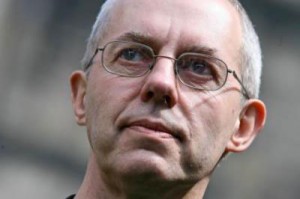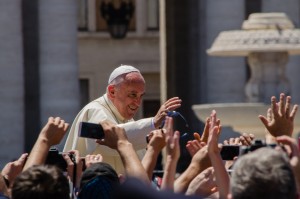 A financial consultant shouldn’t have fundamental misgivings about the morality of money.
A financial consultant shouldn’t have fundamental misgivings about the morality of money.
A geography teacher shouldn’t doubt that the Earth is round.
A nuclear physicist shouldn’t wonder if the atom is really divisible.
If these professionals are indeed beset by such doubts, any sensible person would be justified in thinking they should seek a different line of work.
So what’s one supposed to think of a Christian prelate who publicly admits doubting the existence of God? Especially if he then talks about it at a theological level normally associated with a composite of Chesterton’s ‘village atheist’ and ‘village idiot’?
Exactly the same thing, I dare say. That he’s in the wrong job.
Apparently his Grace the Archbishop of Canterbury experiences his primal doubts on his morning jog, making one wonder if his predecessors in the job, such as St Augustine, St Anselm or William Laud, ever felt the same way – or indeed jogged.
What makes His Athletic Grace so uncertain is the undeniable existence of suffering in the world. Apparently he asks himself the same questions that have been asked by, before and after David Hume:
“If God allows suffering and [insert any disaster of your choice], then he isn’t good. If he doesn’t know about it, then he isn’t omniscient. And if there’s nothing he can do about it, then he isn’t omnipotent.”
All such queries are posed by intuitive atheists seeking to post-rationalise their atheism. That’s the only explanation of why undoubtedly intelligent men, such as David Hume, always sound like children with learning difficulties when asking (or especially trying to answer) such questions.
That’s exactly how His Grace sounds: “We know about Jesus, we can’t explain all the questions in the world, we can’t explain about suffering, we can’t explain loads of things but we know about Jesus. We can talk about Jesus – I always do that because most of the other questions I can’t answer.”
This is the kind of tirade one would expect from a half-crazed, megaphone-toting sectarian in Trafalgar Square, screaming “Jesus is coming! The end is nigh!!!” It’s rather incongruous coming from the leader of one of the world’s three apostolic denominations.
Of course we can’t explain the entire mystery of God, this goes without saying. Any man able to do that would himself be God, which few claim this side of a lunatic asylum.
But there are “loads of things” that anyone with even a cursory knowledge of theology should be able to tackle with reasonable confidence.
The existence of suffering is one such thing: a theologian may explain it in the context of wrongdoing, both individual, of the kind all of us commit regularly, and collective, otherwise known as Original Sin, that of disobedience to God.
Augustine, for example, ascribed evil, and by inference suffering, to the abuse of free will first perpetrated by Adam and Eve. This distorted the original perfect harmony of God’s creation, both in man and nature. Hence the suffering.
Aquinas went even further. He too treated suffering in terms of cause and effect, but he emphasised that every form of existence, including suffering, has a meaning and ultimately contributes to the goodness of the world.
Suffering dialectically emphasises the just order of the universe, and God inflicts it as punishment for that very purpose. Augustine would have agreed: central to his theodicy was the concept of ‘privation’, according to which evil isn’t an entity in itself but merely the absence of good.
Moreover, if imitating Christ is the goal of a Christian life, then any Christian, never mind a prelate, ought to be aware of the redemptive, and therefore positive, value of suffering. Personal observation vindicates this: most people who have suffered grievously emerge the better for it spiritually, intellectually and morally.
I’m merely scratching the surface here, which is all this abbreviated format allows. However, even as strictly an amateur in such matters, I could probably delve quite a bit deeper if pressed.
Yet in this area, as in all others, I defer to professionals, those who have single-mindedly devoted their whole lives to pondering the meaning of God and his creation.
One would like to assume that this category includes the leader of the world’s 80 million Anglicans. Yet His Grace Justin Welby has evidently set out to prove how far this assumption is from the truth.
With prelates like him, is it any wonder Anglicanism has such a hard time in Britain? One almost feels like repeating Henry II’s plea “Will no one rid me of this turbulent priest?”, issued in relation to another Archbishop of Canterbury.
Except that in this instance one could think of a few modifiers that would be more emphatic than ‘turbulent’.








Comments